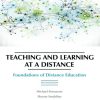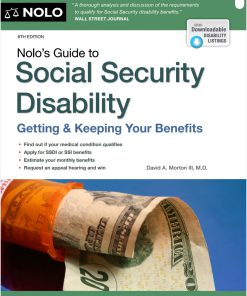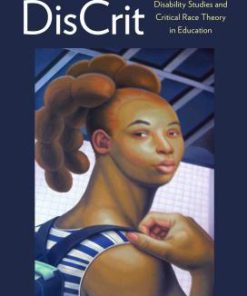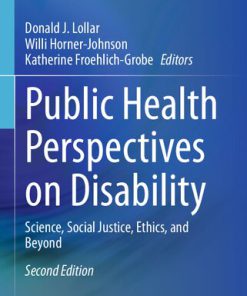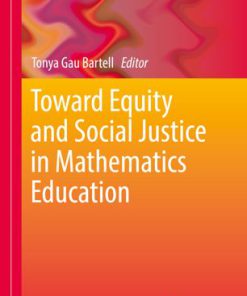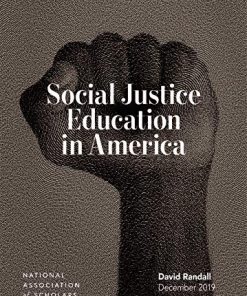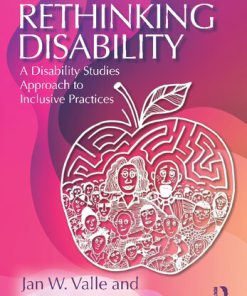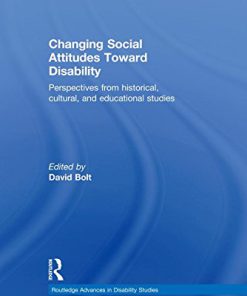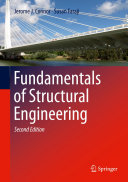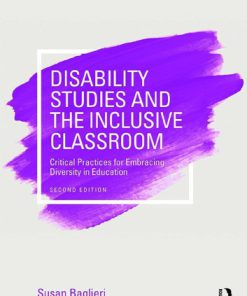Practicing Disability Studies in Education Acting Toward Social Change 1st Edition by David J Connor, Jan W Valle, Chris Hale ISBN 1433125528 9781433125522
$50.00 Original price was: $50.00.$25.00Current price is: $25.00.
Practicing Disability Studies in Education Acting Toward Social Change 1st Edition by David J Connor, Jan W Valle, Chris Hale – Ebook PDF Instant Download/Delivery: 1433125528, 9781433125522
Full download Practicing Disability Studies in Education Acting Toward Social Change 1st Edition after payment
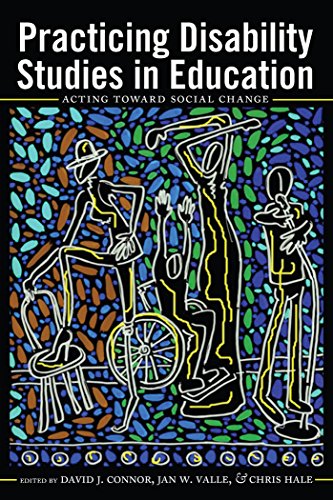
Product details:
ISBN 10: 1433125528
ISBN 13: 9781433125522
Author: David J Connor, Jan W Valle, Chris Hale
Practicing Disability Studies in Education: Acting Toward Social Change celebrates the diversity of contemporary work being developed by a range of scholars working within the field of Disability Studies in Education (DSE). The central idea of this volume is to share ways in which educators practice DSE in creative and eclectic ways in order to rethink, reframe, and reshape the current educational response to disability. Largely confined to the limitations of traditional educational discourse, this collective (and growing) group continues to push limits, break molds, assert the need for plurality, explore possibilities, move into the unknown, take chances, strategize to destabilize, and co-create new visions for what can be, instead of settling for what is. Much like jazz musicians who rely upon one another on stage to create music collectively, these featured scholars have been – and continue to – riff with one another in creating the growing body of DSE literature. In sum, this volume is DSE «at work.»
Practicing Disability Studies in Education Acting Toward Social Change 1st Table of contents:
Section I: Theory
1. Exploring Some Moral Dimensions of the Social Model of Disability
The Social Model and Disability as a Moral Category
Three Schools of Moral Philosophy: An Overview
Utilitarianism
Libertarianism
Communitarianism
Disability, the Social Model, and Theories of the Self
Implications for Disability Studies in Education
References
2. “As a cripple, I swagger”: The Situated Body and Disability Studies in Education
Reluctant Writers and Writing as an Ethic of Care
Body Talk: Embodied Rhetorics of the Self
Body as Situation and Point of View
Expanding the Conversation
Notes
References
3. BEyon|ce|D inclusion: Wud mite[ymouse] be nexterated
References
Section II: Research
4. Enacting Research: Disability Studies in Education and Performative Inquiry
The Case for Integrating DSE and Arts-Based Research
The Educational Theatre Context
Arts-Based Research Meets Disability Studies in Education
The M.O.M. Project: Staging Narrative Research
Teaching Artists at Work: Applying DSE to Practice and Research
Why disability?
Rethinking the research question
Presuming competence
Negotiating representation
The Next Act
References
5. “It was just like a piece of gum”: Using an Intersectional Approach to Understand Criminalizing Young Women of Color With Disabilities in the School-to-Prison Pipeline
Intersections and the Pipeline
An Intersectional Theoretical Framework
Exploring Constructions of Criminal
Research Context and Methodology
Findings
Labeling
Surveillance
Punishment
Participant response to labeling, surveillance, and punishment
Discussion
Implications for Transformative Schooling
Critical pedagogy
Restorative and transformative justice principles
Transformative schools
Conclusion
Notes
References
6. An “In-Betweener” Ethnographer: From Anxiety to Fieldwork Methods in a Cross-Cultural Study of Bilingual Deaf Kindergartners
Shifting From Anxiety to Method in Fieldwork
The Role of Emotional Response and Anxiety in Fieldwork
Contesting Deaf Childhoods, Bilingualism, and Ideologies of In(Ex)clusion
Overview of the Kindergartens for the Deaf in Three Countries Project
Cultural Politics of Difference and Schooling: A Disability Studies in Education Perspective
Voice-Off Episode Revisited
Notes
References
Section III: Practice
7. Practicing What We Teach: The Benefits of Using Disability Studies in an Inclusion Course
In the Beginning: Teaching Inclusively
A History of Teaching Inclusion Courses
The Course Architecture
Special Education With a Critical Eye: The First Third of the Course
Spotlight on Movie Analysis
Spotlight on 24-Hour Cultural Awareness
Some Implications for Schools, Classrooms, and Teaching
The Other Two-Thirds of the Course
Conclusion
References
8. Why We Do What We (Think We) Do: Creating a Campus Coalition From the Perspective of Disability Studies in Education
About the Campus Coalition
Our Coalition and Co-Teaching
Our Coalition and an Educational Philosophy
Our Coalition and a Scientific Strategy—From Je pense, donc je suis (I think, therefore I am) to We Learn/Work, so We Are
Our Coalition and a Political Perspective
Our Coalition and a Dialogue Among Cultures
Why We Do What We (Think We) Do
Concluding Thoughts
Notes
References
9. Madness and (Higher Education) Administration: Ethical Implications of Pedagogy Using Disability Studies Scholarship
Terror at the University: Reasoned Responses to Madness?
Mad at School: A Critical Disability Studies Perspective
Enabling Ethical Discussions of Administrative Praxis
Enabling Ethical Possibilities
Deconstructing the rhetoric of normal/rational in the academy
Alienation and colonialism in the academy: against the medical model
Caring for (mental) difference in ethical contexts
Student reflections of pedagogical possibilities in mad at school
Conclusion: Towards a Pedagogy of Vulnerability
Notes
References
Section IV: Policy
10. Critiquing Policy: Limitations and Possibilities
Introduction
Critical Limitations
Becoming Critical?
The Consequences of Doing Without Critique
Missing or Making the Critical Point?
U.K. research: Resolving theory
Education science silence in Sweden
An Exceptional (U.S.) Response: To Intervention
Assembling Critique
Contrapuntal Critique
Demos-stration
Conclusion: Disability Studies in Education at Work on Policy
References
11. Using Disability Studies in Education to Recognize, Resist, and Reshape Policy and Practices in Aotearoa New Zealand
Introduction
The Aotearoa New Zealand Policy Context
Aims, Implementation and Impacts of Neoliberal Reforms
Pushing Back and Moving Forward
Putting DSE to Work in Aotearoa New Zealand
Recognizing and Resisting Deficit Discourses
How Do We Recognize, Celebrate and Build on Competence?
Collaborative Learning: Learning Together to Support Learning and Being Together
Finally, a Relatively Simple Message
References
12. A Disability Studies in Education Analysis of Corporate-Based Educational Reform: Lessons From New Orleans
Disability Studies in Education (DSE)
DSE Influences on Questions, Design, and Method
Public Education in Post-Katrina New Orleans
Learning From the Experiences of the “Leftover” Children” and Their Families
The New Orleans Charter School Experiment: Legislating Educational Inequity
Notes
References
Conclusion: All That Jazz: Using Disability Studies in Education to (Re)Envision the Applied Field of (Special) Education
The Work of the Ensemble
The Influence of DSE Upon Theory
The Influence of DSE Upon Research
The Influence of DSE Upon Practice
The Influence of DSE Upon Policy
People also search for Practicing Disability Studies in Education Acting Toward Social Change 1st:
practicing disability studies in education
disability studies in education
disability studies examples
disability studies program
disability studies programs online
Tags:
David J Connor,Jan W Valle,Chris Hale,Practicing Disability,Education Acting,Social
You may also like…
Education Studies & Teaching - School Education & Teaching
Mathematics - Automatic Control Theory
Toward Equity and Social Justice in Mathematics Education Tonya Gau Bartell 3319929070 9783319929071
Politics & Philosophy - Social Sciences
Social Justice Education in America 1st edition by David Randall 9780965314312 0965314316
Education Studies & Teaching
Rethinking Disability A Disability Studies Approach to Inclusive Practices 2nd Edition Jan W. Valle
Education Studies & Teaching - School Education & Teaching


